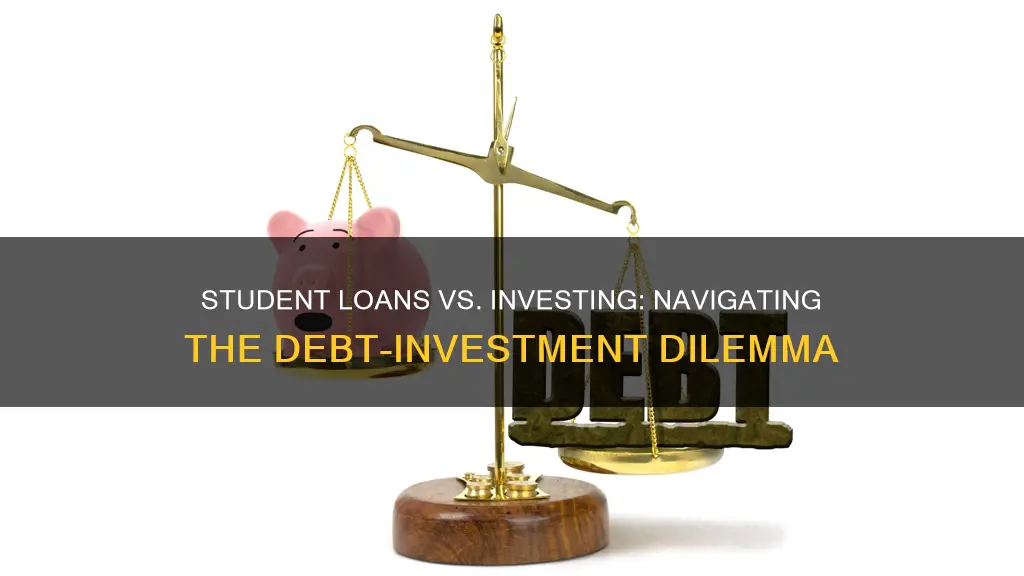
Whether you should pay off your student loans or invest depends on your financial goals and priorities. If you want to become debt-free quickly, putting your extra money towards removing student debt is ideal. However, investing could be a better option if your expected rate of return is higher than your student loan's interest rate or if you want to work on your financial security. You could also choose to do both.
If you have high-interest student loans, especially private loans, you should prioritise paying them off. If you have a low-interest student loan, you may be better off investing.
Before deciding, it's important to first create a budget and build an emergency fund. You should also evaluate the benefits and drawbacks of paying down federal student loans versus private student loans.
| Characteristics | Values |
|---|---|
| Interest rates | Student loan interest rates vary, but a conservative but plausible return on investments is 6% per year. |
| Financial goals | If your goal is to be debt-free, putting your extra money toward removing student debt is ideal. If your goal is to build wealth, investing could be a better option. |
| Tax deductions | Depending on your tax situation, you might qualify for a student loan interest deduction of up to $2,500 per year. |
| Loan forgiveness | If you have federal student loans, you might be able to get student loan forgiveness. |
| Monthly budget | Your monthly student loan payment impacts your monthly budget. |
| Emergency fund | It's important to have a fully funded emergency fund before deciding whether to pay off student loans or invest. |
What You'll Learn

Evaluate your financial situation and goals
Evaluating your financial situation and goals is a crucial step in deciding whether to prioritise paying off student loans or investing. Here are some key considerations to help you make an informed decision:
Monthly Cash Flow and Discretionary Income
Start by assessing your monthly cash flow. Calculate your income and expenses to determine if you have any money left over after covering your necessities. This discretionary income can be used for investing or paying off loans faster. If you're living paycheck to paycheck, you may need to focus on budgeting and reducing expenses to free up cash flow.
Emergency Fund
Building an emergency fund is a critical component of financial planning. Aim to save at least three months' worth of expenses to cover unexpected costs, such as medical bills or car repairs. Having this safety net in place will give you greater financial security and reduce the need to rely on credit cards or loans during emergencies.
Retirement Savings
Evaluate your retirement savings and ensure you're contributing enough to take advantage of any employer-matching programs. The general rule of thumb is to save 10% to 15% of your income for retirement. If you're not on track, consider increasing your contributions to take full advantage of tax-advantaged retirement accounts, such as a 401(k) or IRA.
Student Loan Interest Rates vs. Investment Returns
Compare the interest rates on your student loans with the potential returns on investments. If your student loan interest rates are high, paying them off early can save you a significant amount of money in the long run. On the other hand, if your student loan interest rates are relatively low, investing your money could potentially earn you higher returns over time.
Type of Student Loans
Consider the type of student loans you have—federal or private. Federal loans typically have lower interest rates and offer benefits such as income-driven repayment plans, deferment, and loan forgiveness programs. Private student loans usually have fewer benefits and protections, so you may want to prioritise paying them off first.
Emotional and Psychological Factors
Being debt-free can provide peace of mind and reduce emotional stress. If carrying debt causes you significant worry or anxiety, paying off your student loans early may be a priority for your overall well-being.
Other Financial Goals
Evaluate your other financial goals and how your student loans may impact them. For example, a high student loan balance may prevent you from qualifying for a mortgage or pursuing other financial opportunities. Paying off your student loans faster may help you achieve these goals sooner.
Remember, there is no one-size-fits-all answer to this decision. Carefully consider your unique financial situation, goals, and comfort level with debt to make the choice that aligns best with your priorities.
Mutual Funds: Why Invest?
You may want to see also

Weigh up the interest rates
When deciding whether to pay off student loans or invest, it's important to weigh up the interest rates of your student loans against the potential returns on your investments.
Student loan interest rates
Student loan interest rates vary depending on the type of loan. Federal student loans currently have interest rates ranging from 6.53% to 9.08%, while private student loan interest rates can range from around 4% to about 17%. Federal student loan rates are the same for every borrower, whereas private student loan rates can differ based on the lender, the type of interest rate (fixed or variable), and the borrower's credit score.
Potential investment returns
When considering potential investment returns, it's important to remember that the stock market can be risky and doesn't guarantee returns each year. However, historically, the long-term average annual return of the S&P 500 is about 10%. This means that if your student loan interest rate is lower than the potential returns on your investments, you might be better off investing rather than paying off your student loans early.
Weighing up the interest rates
When deciding whether to pay off student loans or invest, consider the following:
- Compare the interest rates of your student loans to the potential returns on your investments. If your student loan interest rates are higher, you may save more money by paying them off first and avoiding interest charges.
- Consider the potential risks and rewards of each option. Paying off your student loans early can provide peace of mind and reduce the total amount of interest you pay over time. On the other hand, investing early and consistently can lead to higher returns over time, but there is a risk of losing money if the market performs poorly.
- Evaluate your financial goals and priorities. If becoming debt-free is a top priority for you, then paying off your student loans early might be the best option. However, if you're comfortable carrying some debt and want to build wealth for the future, investing may be a better choice.
- Take into account any tax benefits or forgiveness programs that may apply to your student loans. For example, you may be able to deduct a portion of your student loan interest from your taxes, which could offset some of the interest you pay. Additionally, federal student loans may be eligible for forgiveness programs, such as Public Service Loan Forgiveness.
- Ensure you have an emergency fund and are meeting other financial priorities before making a decision. It's generally recommended to have at least three months' worth of expenses saved for emergencies and to be contributing a portion of your income towards retirement before focusing on paying off student loans or investing.
Invest Wisely: Picking the Right Path
You may want to see also

Consider your debt tolerance
Your debt tolerance is a crucial factor in deciding whether to pay off student loans or invest. This involves evaluating your financial situation, risk tolerance, and emotional comfort with debt. Here are some key considerations:
- Financial situation: Assess your monthly cash flow and discretionary income. Do you have money left over after covering your essential expenses, or are you living paycheck-to-paycheck? It's generally recommended to have at least three months' worth of expenses saved for emergencies before deciding between paying off debt or investing.
- Interest rates and potential returns: Compare the interest rates on your student loans with the potential returns on investments. If your student loan interest rates are higher than the expected investment returns, you may save more money by paying off the loans to avoid interest charges. On the other hand, if your student loan interest rates are relatively low, investing may offer higher long-term returns.
- Risk tolerance: Your age, income, time horizon, and debt amount influence your risk tolerance. If you're young, have a high disposable income, and a long investment horizon, you may be more comfortable taking on riskier investments. However, if you have a large debt burden relative to your income, you may prefer to reduce your risk by paying off the debt sooner.
- Emotional comfort: For some people, carrying debt can cause emotional stress and anxiety. If being debt-free would offer peace of mind, you may prioritize paying off your student loans first.
- Tax implications: Consider the tax benefits associated with student loan interest deductions and income-based repayment plans. These can reduce your taxable income and provide some financial relief. Additionally, loan forgiveness programs may be available, depending on your profession and eligibility.
- Other financial goals: Evaluate your other financial goals, such as saving for retirement, building an emergency fund, or investing for the long term. Prioritize your goals based on your personal circumstances and preferences.
In summary, consider your financial situation, risk tolerance, and emotional comfort with debt to determine your debt tolerance. If you have a low tolerance for debt and prefer the certainty of paying off your loans, focus on repayment. On the other hand, if you have a higher risk tolerance and are comfortable carrying debt, investing may be a more attractive option, especially if you can earn higher returns than your student loan interest rates.
Commodity Investing: Risks and Losses
You may want to see also

Assess your monthly budget
When deciding whether to pay off student loans or invest, it's important to assess your monthly budget and financial situation. Here are some key considerations:
Determine your income and expenses
Firstly, list your income sources, such as regular paychecks, commission, side hustles, freelance work, etc. Then, list your essential expenses, including food, utilities, housing, transportation, insurance, and childcare. Make sure you have enough money to cover these necessities.
Create a budget
A popular budgeting strategy is the 50/30/20 rule:
- 50% of your income covers needs like rent, transportation, and healthcare.
- 30% of your income is for discretionary spending, such as dining out, streaming services, and travel.
- 20% of your income is allocated to savings and debt repayment, including an emergency fund, credit card bills, and student loan payments.
However, if your goal is to pay off student debt quickly, you might want to reduce discretionary spending to 15% and allocate more towards your loans.
Evaluate your student loan payments
According to guidelines, student loan payments should ideally stay around or below 20% of your discretionary income or 8% of your total income. A monthly payment exceeding 10% of your income may be challenging to manage.
Explore alternative repayment plans
If your expenses leave little room for student loan payments, consider alternative repayment plans, such as income-driven repayment plans or refinancing. These can help lower your monthly payments and accelerate debt repayment.
Prioritize an emergency fund
Before accelerating debt repayment, ensure you have an emergency fund that can cover three to six months' worth of expenses. This will provide financial security in case of unexpected costs.
Weigh the benefits of investing
If you have extra money after covering your expenses and saving for emergencies, consider investing it. Investing is most beneficial when started early and consistently. Compare the potential investment returns with the interest on your student loans. If the returns are higher, investing may be a better option.
Make informed decisions
Ultimately, the decision to pay off student loans or invest depends on your financial goals and comfort with debt. Remember, you can always invest a portion of your income while also tackling your student loan debt. Striking a balance between debt repayment and investing will enable you to work towards multiple financial goals simultaneously.
Delinquent Utilities: Invest Wisely in Others' Defaults
You may want to see also

Explore loan forgiveness options
Loan forgiveness programs can be a lifeline for those burdened by student loan debt, and there are several options available for those seeking relief. These programs offer the opportunity to have a portion or the entirety of loans forgiven, providing a much-needed fresh start. Here are some of the most well-known student loan forgiveness programs:
Public Service Loan Forgiveness (PSLF)
The PSLF program encourages individuals to pursue careers in public service by offering loan forgiveness after 120 qualifying payments. To be eligible, borrowers must work full-time for a qualifying employer, typically a government agency or non-profit organization. This option is especially beneficial for those with high debt and low incomes, as it provides a light at the end of the tunnel.
Teacher Loan Forgiveness Program
This program is targeted at teachers working in low-income schools or educational service agencies. Eligible teachers can have a portion of their loans forgiven, depending on the number of years they have been teaching and the subjects they teach. Teachers must meet specific requirements and provide certain documentation to qualify.
Income-Driven Repayment (IDR) Plans
IDR plans are designed to make monthly loan payments more affordable, based on a borrower's income and family size. After making payments for a certain number of years, typically 20 to 25, any remaining balance is forgiven. This option is beneficial for those who may never fully repay their loans otherwise.
Forgiveness for Specific Professions
There are also loan forgiveness options available for specific professions, such as nurses, military personnel, and lawyers. These programs offer an incentive to attract individuals to these fields by forgiving a portion or all of their loans, thus alleviating their financial burden.
Perkins Loan Cancellation
Borrowers with federal Perkins loans can have up to 100% of their loans canceled if they work in public service jobs for a certain number of years. Approved borrowers may see a percentage of their loans discharged incrementally for each year worked.
Closed School Discharge
If your school closes while you are enrolled or shortly after you leave, you may qualify for loan discharge. You will need to continue making loan payments while your application is processed, and if approved, you may be refunded past payments.
Borrower Defence to Repayment Discharge
If you were defrauded by your college, you may qualify for debt relief through the Borrower Defence to Repayment program. You will need to file a claim with the U.S. Department of Education, and if your school was involved in widespread fraud, your loans may be discharged.
Total and Permanent Disability Discharge
If you are unable to work due to a total and permanent disability, you may qualify for student loan forgiveness. You will need to provide documentation, and your finances and disability may be monitored for a period after discharge.
Student Loan Forgiveness for Nurses
Nurses with student debt have several options for forgiveness, including Public Service Loan Forgiveness, Perkins Loan Cancellation, and the NURSE Corps Loan Repayment Program, which can pay up to 85% of qualified nurses' unpaid college debt.
Doge Investors: Who and How Many?
You may want to see also
Frequently asked questions
Paying off student loans early can bring peace of mind, in addition to reducing the amount of interest paid over time.
Investing works best when started early and consistently. The potential returns might outweigh what you're paying in interest.
Some factors to consider include your overall financial health, the type of student loan, your financial goals and priorities, and the interest rates on your student loans versus the potential returns on investments.







